What is Google Analytics 4?
You probably use Google Analytics to track visitors to your website and analyse the data for statistical purposes.
The current version of Google Analytics, Universals, will become obsolete as of July 1, 2023 (even if the reports will still be accessible and consultable for a short period), date from which the data will no longer be processed by this version. Since the end of 2020, Google has been providing its new solution: Google Analytics 4, which will completely replace the previous one.
The two versions coexist for now, but their behavior is totally different, so it is particularly interesting to think about installing it now.
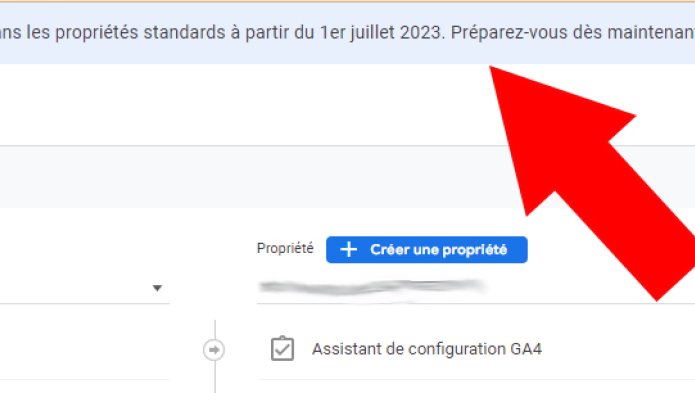
Google Analytics 4 vs. Universal Analytics
There are three major differences between the old and new versions:
- tracking : In UA (Universal Analytics) users are tracked via sessions (time periods during which the user interacts with a site). GA4 (Google Analytics 4) is event-based. Rather than creating a session each time a visitor lands on a page, GA4 records all the events they trigger on the site. This allows Google to analyse more accurately what the user is actually doing on a site, rather than just worrying about the fact that they visit it.
- reports : In UA, there is a whole series of pre-established reports that you can partially customise. GA4 offers 4 or 5 major reports, but you can customise them to the fullest extent, giving you greater freedom to choose the data you think is most important to for you to analyse.
- configuration : UA relies on a system of views and properties whereas GA4 only offers properties that allow you to track both website and app traffic. You can therefore install only one tracking code and have several different properties (e.g. website, Android app and iOS app) to track users on all the platforms they may use.
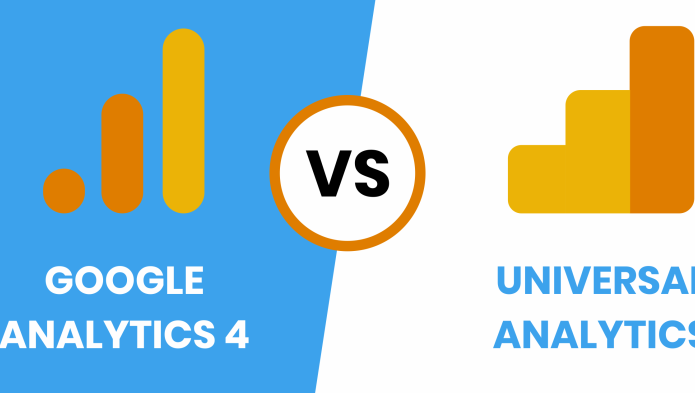
Why update to Google Analytics 4?
After more than 10 years of loyal service, Universal Analytics needed to reinvent itself. Not only because the Internet has changed (users now browse websites and applications, and carry out different actions on each platform) but also because new laws has been put in place by different governments (such as the GDPR) to protect Internet users.
Here are 6 good reasons to switch to Google Analytics 4 now:
1. Collecting data
As explained at the beginning of the article, UA will stop tracking from 1 July 2023. But since the two solutions can coexist for the time being, installing GA4 today will allow you to already collect data that will be processed by the new version of the tool. This data could not be more important for your analyses. If you wait until the deadline to switch to the new solution, you will miss out on a year's worth of precious data!
2. Upgrading is easy
If you are already using Universal Analytics, simply go to your account's admin panel, and in the properties, click on the 'GA4 Setup Wizard' link

You can now create a GA4 property by clicking on the 'Start' button.
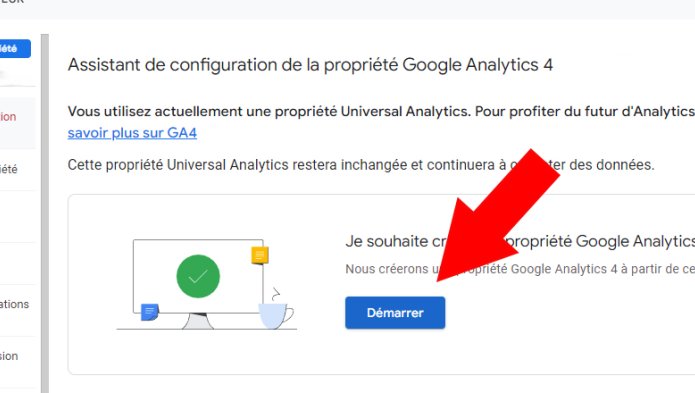
If you are using the tracking code provided by Google you can select the option 'use the same tracking code'. If you are using Google Tag Manager, you will have to configure the tool directly. Once the property is created, go to the 'Data feed' section to set up the tracking as you wish (although the default settings are enough to start with)
3. Reporting is improved
The new reports system is more comprehensive and fully customisable. As well as the basic reports for acquisition, engagement and monetization (where you'll find most of the data you could collect via UA - although there are a few changes), you'll now see a new tab called 'explore' from which you'll have the option of using 6 more advanced, pre-defined report templates.
But where GA4 goes further is that these reports now allow you to combine all the data (metrics, variables and tabs) as you wish. You can also create a free report for complete customisation!
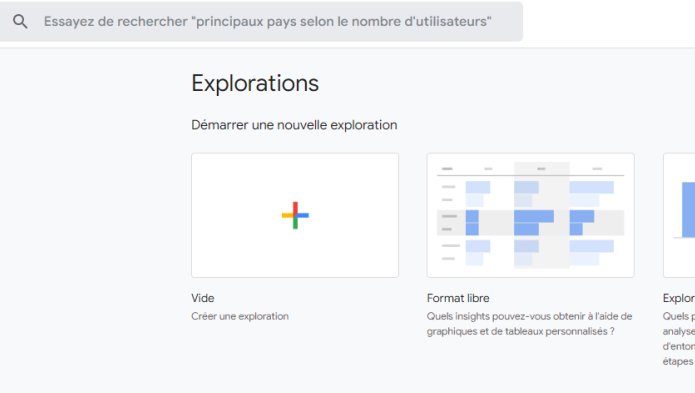
4. Events
With GA4, understanding a user's journey across different platforms is now possible through events.
Imagine a user who downloaded your app, found a coupon and finally bought a product on your website. You can now exclude this user from a future remarketing campaign on Google Ads for example. This was not possible before. You will quickly understand the benefits in terms of optimising your marketing/communication budgets.
In the same way, you should also know that GA4 is able to track a good number of events such as scrolls on a page, clicks, views of a video on Youtube,... You can also create all the custom events that you think are useful.
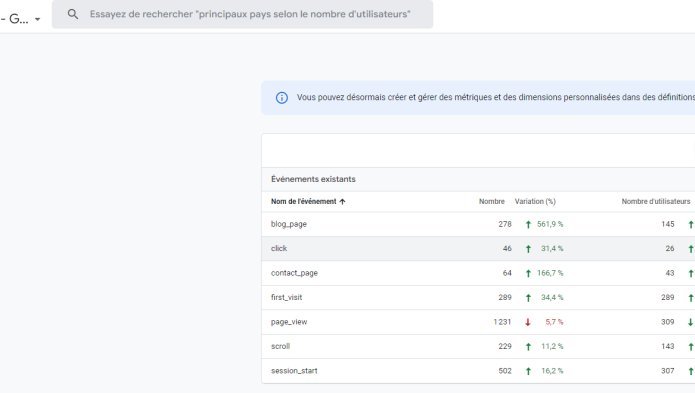
5. Machine learning
While UA used to rely on sessions and cookies for all its data collection, the various laws and regulations introduced to protect the privacy of Internet users have forced Google to change its position. The perspective of a cookieless web (cookies used for commercial purposes being very likely to disappear) has accelerated the development of GA4, which is now based on... predictions.
Indeed, GA4 uses machine learning, which combines artificial intelligence and computer science, to fill in the missing information following the gradual disappearance of cookies. Thanks to predictions, GA4 is now able to extrapolate and provide very precise hypotheses and insights about users: behaviour, trends, abnormal behaviours, etc.

6. Importing data
New in GA4: the tool now offers you a function to easily import other data from an external source into your property: excel files, CRM files, data from a physical point of sale,... You can then combine the two sources of information to obtain more complete reports.
Let's take an example: you manage several physical shops selling vinyl records, you have created an e-commerce site and an application to sell online, and you use a CRM to follow up your customers. If you want to track, understand and analyse your customers' behaviour across all these channels, you need to connect and combine data from all these potential sales sources. This is now possible with the new GA4 import system!
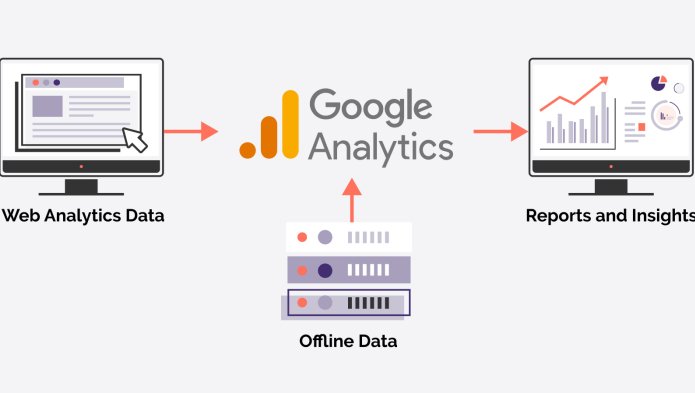
What about GDPR?
Is the new version of Google Analytics compliant with the GDPR and the requirements of the European authorities? This is the question that has been heard often since its launch in October 2020.
It is particularly via the CNIL (Commission Nationale de l'Informatique et des Libertés) that voices have been raised to question the data processing carried out by Google. To date, it is impossible to know whether the use of GA4 will comply with European legislation in July 2023.
Indeed, even if Google has adapted its tool in the way of better confidentiality for users, there are still efforts to be made, particularly regarding the hosting of data in the United States. It will therefore be important to follow the developments that will be made to the platform in the coming months.

Conclusions
As explained above, we advise you to switch to Google Analytics 4 as soon as possible to start collecting data that will allow you to compare your performance in 2023 with 2022. This will no longer be possible in less than a year if you remain on Universal Analytics only
The second step will be to set up the tool properly so that you can extract the most relevant insights for your business. The fact that you start today will allow you to better understand the platform as it should be.
Finally, it is important to keep up to date with the evolution of the tool in terms of data protection. There is no doubt that Google will put in place solutions to remain in compliance with the legislation.



